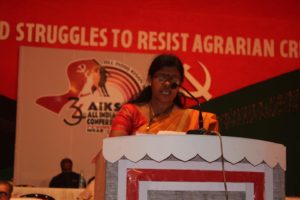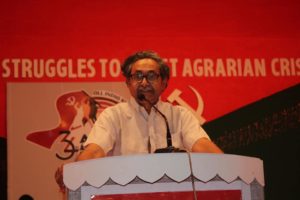34th Conference Resolution on The Role of Women in Agriculture
 Women’s pivotal role in agriculture has never been recognized fully. They work as female agricultural labourers, as farmers, co-farmers, family labourers and (with male out-migration, widowhood etc.) as managers of the farm and farm entrepreneurs. This is reflected in the workforce distribution within rural regions where more than 80 percent of the female workforce is dependent on agriculture. According to the Census of 2011 there were approximately 149.88 million women workers in India out of which approximately 121.83 million were dependent on agriculture and allied activities. More than 82 million of these workers (i.e. approximately 55 percent) identified themselves as agricultural labourers, whereas only approximately 30 million identified themselves as cultivators. It should be noted that the number of men and women agricultural workers identifying themselves as cultivators has come down substantially in the last one decade especially due to the policies of land dispossession followed by the current Modi-led government.
Women’s pivotal role in agriculture has never been recognized fully. They work as female agricultural labourers, as farmers, co-farmers, family labourers and (with male out-migration, widowhood etc.) as managers of the farm and farm entrepreneurs. This is reflected in the workforce distribution within rural regions where more than 80 percent of the female workforce is dependent on agriculture. According to the Census of 2011 there were approximately 149.88 million women workers in India out of which approximately 121.83 million were dependent on agriculture and allied activities. More than 82 million of these workers (i.e. approximately 55 percent) identified themselves as agricultural labourers, whereas only approximately 30 million identified themselves as cultivators. It should be noted that the number of men and women agricultural workers identifying themselves as cultivators has come down substantially in the last one decade especially due to the policies of land dispossession followed by the current Modi-led government.
 In this context, it must also be noted that a large section of the women’s agricultural work is invisible in official employment statistics and also get unnoticed in agricultural policies. This can be largely attributed to lack of property and land rights for women even 70 years after independence. Though, women’s movements have been demanding ‘joint pattas’ for women agriculturalists for the last many decades, hardly any progress has been made on this account. Further, a lot of the unpaid work done by women involves access to common property resources like forests, grazing lands and water (all of which are crucial for survival). This access and rights have been severely impacted in the recent times with the corporate harnessing of nature and the corporatisation of agriculture. Today almost the entire female agricultural workforce can be classed as ‘vulnerable workers’ who have no social protection because their work is either invisible or subjected to a high degree of informalisation. This has also resulted in continued and widening gender wage gaps in agriculture has increased.
In this context, it must also be noted that a large section of the women’s agricultural work is invisible in official employment statistics and also get unnoticed in agricultural policies. This can be largely attributed to lack of property and land rights for women even 70 years after independence. Though, women’s movements have been demanding ‘joint pattas’ for women agriculturalists for the last many decades, hardly any progress has been made on this account. Further, a lot of the unpaid work done by women involves access to common property resources like forests, grazing lands and water (all of which are crucial for survival). This access and rights have been severely impacted in the recent times with the corporate harnessing of nature and the corporatisation of agriculture. Today almost the entire female agricultural workforce can be classed as ‘vulnerable workers’ who have no social protection because their work is either invisible or subjected to a high degree of informalisation. This has also resulted in continued and widening gender wage gaps in agriculture has increased.
This vulnerability is only increasing with the neo-liberal policies of the government which have resulted in the supply of cheap migrant women and child labour to large farmers in rich states like Maharashtra and Gujarat. The impact of the continuing three decade long agrarian distress is also immense of on women. With more than 3 lakh male farmers committing suicides, the number of female headed households in agriculture has increased from 10 percent to 12.88 percent between 2001 and 2011. Many of these households a headed by widows who have become helpless in the wake of rising loans and lack of support from the government. Further, the increase in household distress has forced women to look for agricultural work outside their own homes and become vulnerable to the oppression of contractors and sub-contractors many of whom are indulging in trafficking of women and child labour. The Global Trafficking Report, 2016 (published by the UN) shows that instances of increased trafficking are intimately linked with agrarian distress.
Given this abysmal situation, it is not surprising that women farmers and agricultural workers have been at the forefront of the struggles of the All India Kisan Sabha and the Agricultural Workers Union in the last three years. This Conference of the All India Kisan Sabha, resolves to continue to organise these women farmers and demand:
1. A comprehensive national policy to address the concerns of women farmers and agricultural workers. It should be noted that such a policy was proposed by the National Commission of Women (at the instance of Swaminathan Commission) in 2009, but was largely ignored by all successive governments.
2. The protection and recognition of women’s land rights on private and common property resources.
3. Protection of women’s forest rights and implementation of joint pattas in the forest rights act.
4. Comprehensive social protection of all women agricultural workers and the recognition of all their paid and unpaid labour as ‘work’. Portable identity cards for migrant women workers.
5. A comprehensive loan relief and rehabilitation plan of the widows of farmers who have committed suicides in the last three decades.
6. A comprehensive gender sensitive, socio-economic rehabilitation plan for all families of dispossessed.
7. Implementation of the Equal Remuneration Act in agriculture and allied activities.
8. Implementation of labour laws in farms operated by corporate houses and registration of contractors supplying women and child labour to such farms.
9. Strict implementation of anti-trafficking laws in rural regions.
Proposed By: Preeja
Seconded By: V.K.Ramachandran

